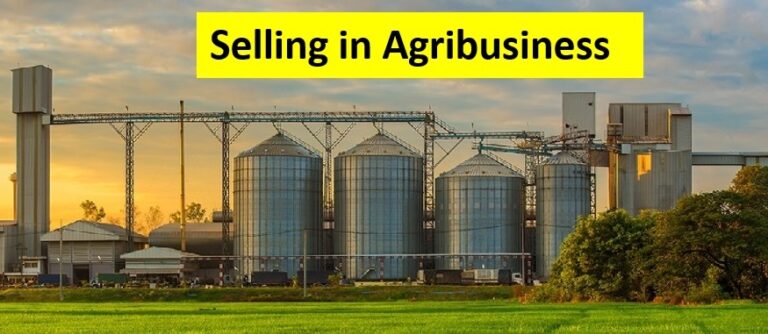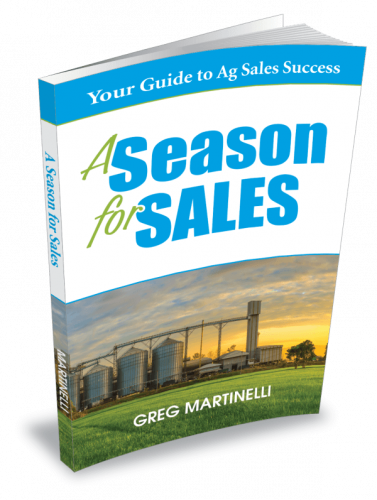Says every farmer in today’s economy
If you call on farmers or livestock producers, then you hear that quote far too many times on your sales calls. So often that you believe it’s true. So often that you hang your head and struggle to make sales calls on current customers, let alone cold call on prospects. You just know that you will get a shotgun blast if you cold call on a farmer and try to sell them a $600,000 piece of equipment, or building!
If this is you:
- Don’t lose hope.
- Don’t hang your head.
- Most importantly, don’t buy into the easy story line that, “I can’t afford it”.
Instead, here are 4 thoughts to build your confidence in what you do as a salesperson:
- Every field gets planted every year. Even in the toughest of economic times, I see every field getting planted and producing a crop. So, they are going to keep farming every acre. It might not be the same people planting those fields, but they will get planted. They will need your crop inputs and equipment to do so.
- Every one of the 9 billion people on earth will continue to eat, every day. They won’t all get three meals, but biologically, they strive for it. At some point, if no one can truly afford to farm, then supply and demand will make it profitable.
- Successful businesses will pivot in tough times. In a free market, no one is guaranteed a profitable business. That includes farmers and agribusinesses. As tough times arrive, you and your customers need to determine if it is temporary or long term. If you decide it’s temporary, then you might just suffer through and live off of your equity. A producer may struggle through and live off loans or vendor credit. You could even suggest they live off of selling a few acres, but I know that is probably like telling them to sell their children. However, if at some point, it is decided that this is a long-term downward cycle in farm economics, then a successful producer or agribusiness will need to pivot. In your sales territory, which customer segment is doing better than the others? Which products are a better fit for customers in a tight economy? Could we create a whole new product specific to this market in this economy? If a producer thinks this is long term, then what other crops can they possibly grow to guard against it? Are there specialty crops or livestock that could easily be farmed with their land and equipment? As their salesperson who travels the state, are there people you can network to help them make those decisions?
- Dig into the ROI details like a police detective. I have heard about the economic difficulty of being a farmer for 32 years. I even heard it in the big ethanol years, when corn prices took off and inputs had not. Please don’t misunderstand. I think it is a very difficult business. Long hours, high dollar investments, lower gross margins, and all at the mercy of the weather and a shifting political landscape. However, we know we will not stop eating.
When a customer tells you they can’t afford it or the ROI (return on investment) doesn’t justify the purchase, please stop the first time you hear that statement and do this:
a. Ask them to explain how they came up with that decision. How did they decide that they can’t afford it? I know that might sound pushy or invasive. But you need to know if they actually calculated out the math of an ROI or just think it doesn’t ROI. You have been tasked with growing the sales of your company. You need to know if this is true. Do your products truly ROI or not? Which ones do and which ones don’t? If none of your products ROI, you better have some internal discussions before hitting the country.
Recently, I worked with a group of salespeople that said customers don’t like sharing their numbers. I pushed back to say, “In your self-evaluation, you said one of your greatest strengths as a salesperson is developing relationships with customers. If so, then certainly your best customers would help you walk through an ROI calculation. If not, then what relationship are you good at developing?” I further explain that you don’t have to use their exact numbers. However, they can give you better numbers than you might come up with.
b. True ROI is very difficult to determine in most businesses. We think it’s a simple math equation. Your quoted price is their “I” and the “R” is their increased crops or animals sold because of your products. Simple until you dig into it a bit deeper. Dollars or the cost of your products and the extra dollars brought in because of your product are only one aspect of their value. There are two other aspects that most salespeople forget to bring into the equation. Those other two values are “Time” and “Emotion”. The three ways customers gain value from anything is dollars, time, or emotion. My recommendation is discovering your customers opinion of what time and emotion are worth before you get to any discussion around the dollars and cents of your product. In the early part of a sales call, customers are much more open about struggling with their busy schedule and what that is costing them or how emotion is limiting them. Once you get to the excel spreadsheet showing your pricing info, their guards go up about the value they place on time or emotion.
c. Last question on ROI. Before ending that discussion with your customer, ask them, “I know you said my product is too expensive or you can’t afford it, but I’m curious, at what price would corn, beans, milk, or cattle have to get to in order for you to afford it?”
Your farmer customers are struggling to stay afloat right now, more than probably ever in their farming history. Unless they farmed through the 1980’s, right now is their most difficult time. So, don’t be fooled into thinking you are not welcome on the farm….that you shouldn’t be selling…that your pricing is the cause of poor farm economics. Instead, get into the weeds on all three value components and help your customers. Trust me, they will remember it when the going gets better….And the going will get better!


